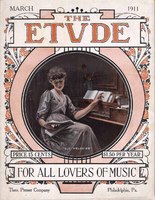Dear friends—you who have written to us asking whether it is too late to start at eighteen, twenty, twenty-five, thirty, even forty and fifty years of age—you have no idea how close the bond between you and The Etude really is. We are all starting late. No man or woman of consequence has ever escaped the disconcerting experience of discovering that in order to succeed it will be necessary to dig away some obstacle which might have been removed at an earlier age if Fate and Opportunity had been with them. Every day presents new obstacles, but we keep on digging, sometimes intelligently and sometimes blindly, until we stop, and find that the obstacle is behind us, and we are facing a new obstacle. That is the game that you and we are in, friends—waiting, digging, fighting, conquering, and then perhaps for a little while—resting. The fun is in the struggle, in the battle. No matter how peaceful our means, it is all a battle for success—success as each sees it from his individual standpoint.
Some of us start in the battle handicapped by years, weakness and the apparent strength of rivals. Physical weakness becomes a toy for ambition and genius. What was weakness to Chopin, Schumann, Mrs. Browning, Ruskin, Swift, Stevenson, Darwin and, greatest of all, the blind, deaf and dumb Helen Keller, whose books have almost as large a sale in Germany, France and England as in the United States? One-tenth of the accomplishments of any one of these conquerors of fate would put to shame the best that we have done. Think of that when you confront the tiny little obstacles which seem like mountains to you now. There is courage in the very smoke of the battle they have waged.
Is it too late? No, not if the purpose you seek to accomplish is within the range of human possibility. Age robs us of the elasticity of the muscles, the arteries harden with years, the memory becomes less acute—all of these are obstacles; but if you think the fight is worth it and are willing to battle to win, you stand a good fighting chance. The child who has kept his fingers flying over the keyboard for years acquires an agility which is very difficult, often impossible, for the adult to acquire.
Few adults starting to play the piano at the age of thirty, without any previous digital exercises, are likely to become virtuosos. However, we have observed in our own teaching at least ten or twelve instances of adults, some past forty, who have started with but very little previous musical experience and have attained a surprising efficiency. If they have done it you certainly stand a chance. Anyway, it is always worth while to seek what Milton calls “the joys which ambition finds.” Some of the greatest accomplishments of the immortal have been attained by starting when others thought that it was too late. We are told that when St. Ignatius de Loyola, the Spanish educator and founder of the powerful Society of Jesus, determined to become a priest at the age of thirty-three, he realized his ignorance and entered a school with little boys, studying side by side with them. Have you the courage of Loyola? We are told that it was not until after marriage that Andrew Jackson gave any serious attention to education, yet he became one of the most popular Presidents we have ever had. Have you the ambition of Jackson? Tschaikowsky was twenty-three when he gave up a lucrative government post for the life of “poverty” which was to lead him to ultimate success as a musician. Have you the determination of Tschaikowsky? Ambition, determination, courage and, most of all, real love for your work will remove almost any obstacle which years, hereditary weaknesses or financial deficiencies may present.



